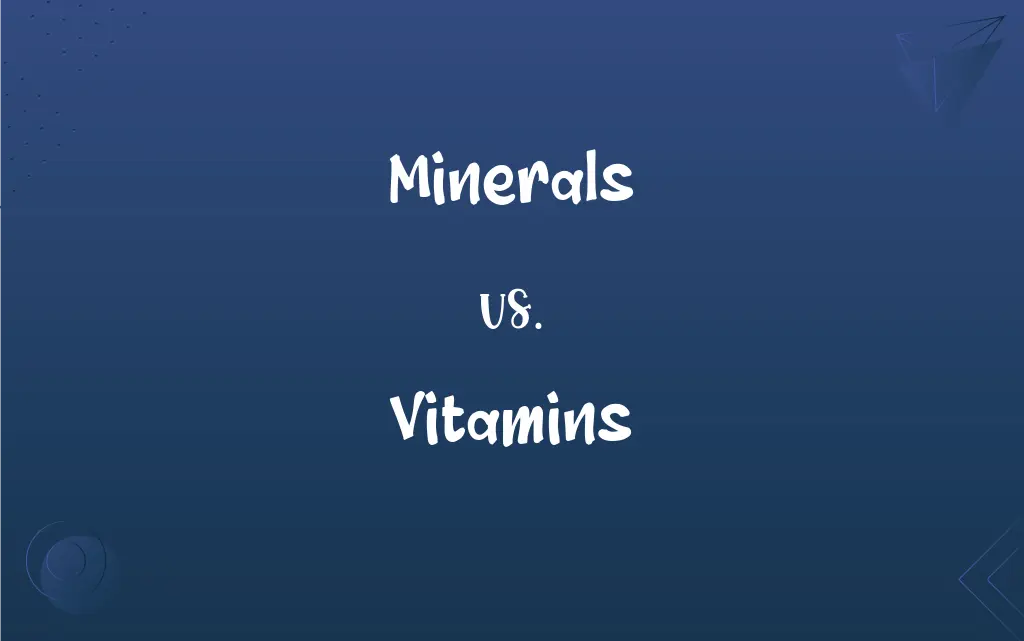Minerals vs. Vitamins: What's the Difference?
Edited by Aimie Carlson || By Harlon Moss || Published on January 14, 2024
Minerals are inorganic substances essential for body functions; vitamins are organic compounds crucial for growth and health.

Key Differences
Minerals, inorganic elements derived from the earth, are vital for various bodily functions. Vitamins, organic compounds, are necessary for growth, immune function, and overall health.
The body requires minerals in specific amounts to maintain bone health, nerve function, and fluid balance. Vitamins, required in smaller quantities, play crucial roles in energy production and cellular processes.
Minerals, such as calcium and iron, are crucial for structural and metabolic roles. Vitamins, like Vitamin C and Vitamin D, are essential for processes like skin health and bone strength.
Minerals are obtained from a wide range of foods, including vegetables, meats, and grains. Vitamins are found in various foods, with different vitamins prevalent in fruits, vegetables, and animal products.
An imbalance of minerals can lead to health issues like osteoporosis or anemia. Vitamin deficiencies or excesses can result in conditions like scurvy or hypervitaminosis.
ADVERTISEMENT
Comparison Chart
Nature
Inorganic elements
Organic compounds
Sources
Earth, soil, water, food
Plant and animal-based foods
Functions
Structural roles, nerve function
Energy production, immune support
Types
Calcium, Iron, Potassium
Vitamin A, B vitamins, Vitamin C
Deficiency Diseases
Osteoporosis, anemia
Scurvy, beriberi, rickets
ADVERTISEMENT
Minerals and Vitamins Definitions
Minerals
Naturally occurring substances crucial for health.
Calcium, an important mineral, is needed for strong bones.
Vitamins
Essential nutrients needed in small amounts.
Vitamin D is important for bone health and calcium absorption.
Minerals
Inorganic elements essential for bodily functions.
Iron, a mineral, is vital for transporting oxygen in the blood.
Vitamins
Organic compounds necessary for body growth and health.
Vitamin C is crucial for immune health and skin integrity.
Minerals
Elements that support metabolic and structural processes.
Zinc, a trace mineral, aids in immune function and wound healing.
Vitamins
Play key roles in body functions and preventing deficiencies.
B vitamins are essential for energy metabolism and nervous system health.
Minerals
Essential nutrients obtained from diet and supplements.
Magnesium, a mineral, plays a role in over 300 enzymatic reactions.
Vitamins
Organic molecules aiding in various bodily processes.
Vitamin E acts as an antioxidant, protecting cells from damage.
Minerals
Found in various foods, they are vital for growth and health.
Potassium, a mineral, is important for maintaining heart health.
Vitamins
Obtained from diverse food sources and supplements.
Vitamin A supports vision health and immune function.
Minerals
A naturally occurring, homogeneous inorganic solid substance having a definite chemical composition and characteristic crystalline structure, color, and hardness.
Vitamins
Any of various fat-soluble or water-soluble organic substances that are essential in minute amounts for normal growth and activity of living organisms. They are synthesized by bacteria and plants and are obtained by animals chiefly in their diet.
Minerals
An element, such as gold or silver.
Vitamins
A preparation containing one or more vitamins, often taken as a dietary supplement.
Vitamins
Plural of vitamin
FAQs
What are minerals?
Minerals are inorganic substances found in nature, essential for various bodily functions.
How do minerals benefit the body?
They support bone health, regulate fluid balance, and assist in muscle function.
What are trace minerals?
Trace minerals are required in smaller amounts, like iron, manganese, copper, iodine, zinc, cobalt, fluoride, and selenium.
What are major minerals?
Major minerals include calcium, phosphorus, potassium, sulfur, sodium, chloride, and magnesium.
What is mineral deficiency?
It's a lack of essential minerals, impacting health, like iron deficiency causing anemia.
How do minerals differ from vitamins?
Minerals are inorganic and maintain their chemical structure, while vitamins are organic and can be broken down.
What are vitamins?
Vitamins are organic compounds crucial for bodily functions and preventing diseases.
What's the difference between fat-soluble and water-soluble vitamins?
Fat-soluble vitamins (A, D, E, K) are stored in the body's fatty tissues, whereas water-soluble vitamins (B and C) need to be replenished regularly.
Can you get minerals from water?
Yes, minerals can be absorbed from drinking water, especially hard water.
How many vitamins are there?
There are 13 essential vitamins, including A, C, D, E, K, and eight B vitamins.
Can minerals be toxic?
Yes, excessive intake, especially of trace minerals, can be toxic.
What foods are rich in minerals?
Dairy, meat, fruits, vegetables, nuts, and whole grains are good sources.
How do vitamins benefit the body?
They support immune function, energy production, and cell and tissue health.
What are the best sources of vitamins?
Fruits, vegetables, whole grains, dairy products, and lean meats are excellent sources.
What is vitamin deficiency?
A lack of essential vitamins leading to various health problems, like scurvy from Vitamin C deficiency.
Can vitamins interact with medications?
Yes, some vitamins can affect how medications work.
Do minerals interact with medications?
Yes, some minerals can affect medication absorption and efficacy.
Can you overdose on vitamins?
Yes, particularly with fat-soluble vitamins, as they are stored in the body.
Do cooking methods affect vitamin content?
Yes, some vitamins are sensitive to heat, light, and air, and can be lost during cooking.
What are antioxidant vitamins?
Vitamins like C, E, and A, that help protect the body from damage by free radicals.
About Author
Written by
Harlon MossHarlon is a seasoned quality moderator and accomplished content writer for Difference Wiki. An alumnus of the prestigious University of California, he earned his degree in Computer Science. Leveraging his academic background, Harlon brings a meticulous and informed perspective to his work, ensuring content accuracy and excellence.
Edited by
Aimie CarlsonAimie Carlson, holding a master's degree in English literature, is a fervent English language enthusiast. She lends her writing talents to Difference Wiki, a prominent website that specializes in comparisons, offering readers insightful analyses that both captivate and inform.






































































